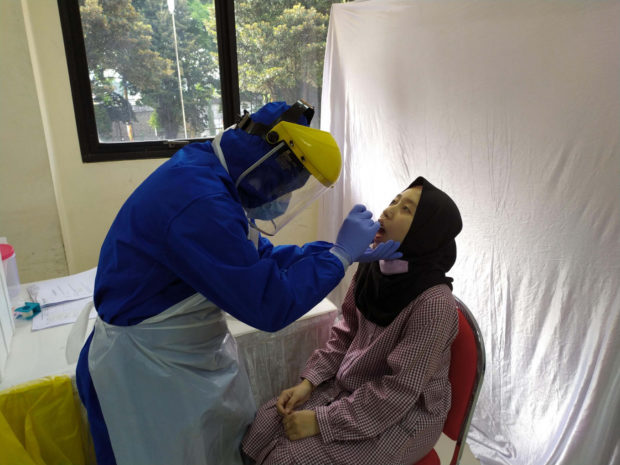In Indonesia, 14 doctors die of COVID-19 in a week

A nurse conducts a swab test, also known as a polymerase chain reaction (PCR) test, on a woman at Tanah Abang district office in Jakarta on June 21. The swab test session was hosted by the Indonesian Heart Foundation in cooperation with Bunda Hospital, Good Doctor and Grab Health. The Jakarta Post/Asia News Network/P.J. Leo
JAKARTA — With the COVID-19 pandemic still accelerating at an alarming rate, healthcare workers remain prone to the virus and social persecution, a medical association and human rights association have said.
The Indonesian Medical Association (IDI) on Monday reported that at least 61 doctors across Indonesia had died in the fight against COVID-19.
“In the past week, 14 doctors have died [of COVID-19],” IDI spokesperson Halik Malik told The Jakarta Post on Monday. “It is the highest number of cases reported within a week, and they mostly came from East Java.”
On Monday alone, the IDI announced the deaths of five doctors from the coronavirus, namely Abdul Choliq from Probolinggo of East Java, Zulkiflie Saleh from Banjarmasin of South Kalimantan, Arief Agustono Hadi from Lamongan of East Java, Budi Luhur from Gresik of East Java and Deni Chrismono Raharjo from Surabaya of East Java.
“Many doctors were unable to get access to swab tests. Many died even before being tested,” Halik explained, adding that the government needed to provide healthcare workers with access to polymerase chain reaction (PCR) tests in every health facility.
According to the Indonesian Nurses Association (PPNI), at least 167 nurses nationwide were confirmed to have had the disease so far.
However, PPNI chairman Harif Fadhilah said the East Java PPNI alone had recorded at least 277 nurses who were COVID-19 positive in the province. He went on to say that with many cases that went unreported, he assumed that the total number of nurses with COVID-19 might exceed 400.
“It is hard for us to verify the actual number as nurses usually report their health status voluntarily. Some may also not report their positive COVID-19 result due to negative stigma, work pressure and many other factors,” he added.
Harif also added that the PPNI had recorded 43 deaths of nurses nationwide as they battled against the virus, 11 of them in East Java.
The PPNI also received reports that nurses working in non-COVID-19 referral hospitals were still dealing with shortages of personal protective equipment (PPE).
Amnesty International Indonesia released on Monday a report documenting the experiences of healthcare workers on the front line battling the COVID-19 pandemic, saying that the government is accountable for the deaths of many medical workers in the country because of the disease.
The organization’s report revealed that as of Monday at least 89 healthcare workers — consisting of 60 doctors, 23 nurses and six dentists — in Indonesia had died because of the virus.
“Not only do healthcare workers have to work extra hours during the pandemic, but they are also being unfairly paid and dealing with fear of the risks of COVID-19 on a daily basis,” Amnesty International Indonesia executive director Usman Hamid said in a webinar, entitled “Global report: Health workers silenced, exposed, attacked”, on Monday.
In addition, the organization reported that as of June 12, at least 878 healthcare workers in Indonesia had contracted COVID-19, at least 225 of them residing in East Java province – the current COVID-19 epicenter in the country.
“Those are the numbers that are able to be verified by organizations like us. If only the government also verifies the report on the matter, the actual numbers might be higher than what we provided,” Usman added.
Amnesty International Indonesia also reported that as of June 2, at least 189 health workers had been laid off due to the crisis resulting from the pandemic.
“Health workers have also experienced stigma and violence because of their job,” Usman said.
The organization has recorded eight cases of healthcare workers being rejected from their respective rooming houses. In one instance, local residents rejected the funeral of a nurse who had died of COVID-19, near a residential complex.
“We urge the state to take its response to COVID-19 seriously and to better protect those healthcare workers who are battling the pandemic at the forefront,” Usman concluded. “The state must ensure adequate compensation for health workers and protect those who have faced reprisals for raising health and security concerns to prevent further unjust treatment against health workers.”
As of Tuesday, Indonesia had recorded 78,572 confirmed cases of COVID-19 with 3,710 fatalities.
For more news about the novel coronavirus click here.
What you need to know about Coronavirus.
For more information on COVID-19, call the DOH Hotline: (02) 86517800 local 1149/1150.
The Inquirer Foundation supports our healthcare frontliners and is still accepting cash donations to be deposited at Banco de Oro (BDO) current account #007960018860 or donate through PayMaya using this link.